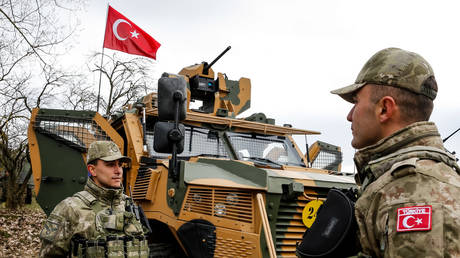
The 1990 conventional arms reduction pact became meaningless after Russia’s exit, Ankara said
Ankara has suspended its participation in the key European arms control pact that was meant to forestall new conflicts from emerging on the continent after the end of the Cold War.
According to the decree signed by President Recep Tayyip Erdogan and published on Friday, Türkiye will stop the implementation of the Treaty on Conventional Armed Forces in Europe (CFE) on April 8.
Foreign Ministry spokesman Oncu Keceli said that “there was no possibility to continue meaningful implementation of the treaty” since Russia left the accord in November.
The original CFE was signed in 1990 by NATO and the Soviet Union. Its principal goal was to cap the number of tanks, armored combat vehicles, artillery and aircraft either side could deploy between the Atlantic coast and the Ural mountains. The agreement was later amended to reflect the breakup of the Soviet bloc and the expansion of NATO eastwards during the late 1990s.
NATO members have refused to ratify the adapted version of the CFE, which ultimately led to its 2007 suspension by Russia. Moscow also cited Washington’s plans to station anti-air missiles in Europe as one of the reasons for the pact’s demise.
Russia quit CFE altogether in November 2023, arguing that the once-promising agreement had become pointless due to the West’s military support for Ukraine, anti-Russian sanctions and other “hostile policies.” The US suspended its own participation in CFE following Russia’s withdrawal.
The CFE is not the only landmark arm control pact that has become defunct due to the current tensions between Russia and NATO. In 2019, the US withdrew from the 1987 INF Treaty, which restricted the number of American and Russian ground-launched medium-range nuclear missiles. Moscow quit the agreement last year. The treaty fell apart as both countries were accusing each other of secretly violating it.
READ MORE: US to build weapons warehouse in Arctic Europe – media
In 2020, the US left the Treaty on Open Skies, which allowed mutual surveillance flights over the entire territory of the participants. Russia followed suit, abandoning the accord a year later.




